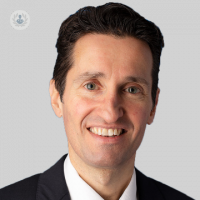Presbyopia: correcting vision without glasses
Written by:Presbyopia is the normal change in vision at close range that develops with time, it gradually affects individuals older than 40 years. It is a growing cause of visual disability due to ageing of the global population, but also due to the increasing use of mobile phones, computers and tablets. We spoke with Mr Aris Konstantopolous to find out what exactly happens to our eyes when experiencing presbyopia and how it can be treated without the need for glasses.

What are the symptoms of presbyopia?
The first symptoms are increasing strain and tiredness when reading small print. You may tend to hold your phone or book further away in order to bring images and text into focus if you have presbyopia.
What causes presbyopia?
Presbyopia is caused by a natural decline in the elasticity of the normal lens inside your eye. This results in your lens losing its ability to focus easily and is associated with sluggishness or difficulty in focusing on near objects. This condition is called presbyopia but sometimes it is referred to as dysfunctional lens syndrome.
How can Presbyopia be treated?
The elasticity of your natural lens cannot be restored! However, there are some great options available to restore your near vision:
PRESBYOND laser blended vision
PRESBYOND uses laser to sculpt the cornea and focus the dominant eye for distance and the other eye for near vision. It is different to traditional monovision, as the sophisticated procedure expands the depth of focus for each eye and creates a smooth transition (blend zone) between the two eyes. This improves your vision whether you are driving a car or reading a book, this can reduce or even eliminate the need for glasses.
PRESBYOND laser treatment is suitable for most people who require glasses for reading and for work. It is used primarily to compensate for reading glasses, however, the procedure is combined with correction of pre-existing short-sightedness (myopia), long-sightedness (hyperopia) and also astigmatism.
Refractive lens exchange
Your natural lens can be replaced with a new multifocal intra-ocular lens that will provide both distance and near vision. The new lens does not require replacement and stays in place for life. The procedure also treats underlying refractive errors of the eye, such as short-sightedness (myopia), long-sightedness (hyperopia) and astigmatism.
Our personal preference is to perform lens exchange if you are not suitable for PRESBYOND laser vision correction, e.g. if you have early cataract or a high prescription.
Contact lenses
Multifocal contact lenses are becoming very popular. They can provide good distance and near vision, but commonly their vision quality is affected by the movement of the contact lens when blinking. Contact lens wear does also carry on-going and long-term risks, such as intolerance, dry eye, vision loss and infection.
To learn more about PRESBYOND and refractive lens exchange, visit his website, Aris Vision Correction.
If you suffer from short-sightedness ( myopia ), long-sightedness (hypermetropia), astigmatism or need reading glasses, book an appointment via Mr Konstantopoulos' Top Doctors profile .


